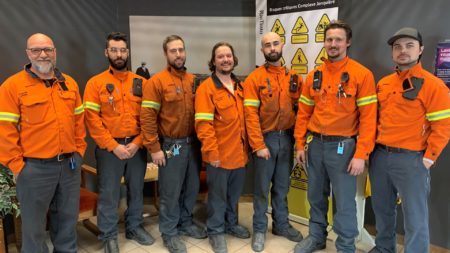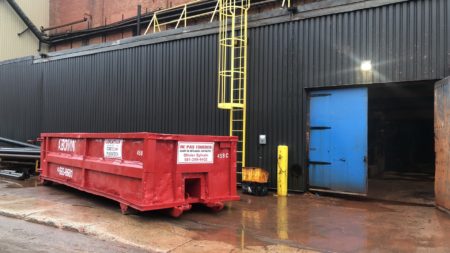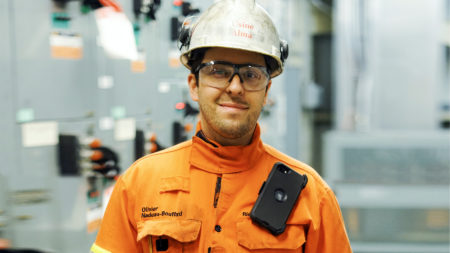Mass Hiring and Intensive Training at Arvida Works

Pictured, from left to right: François Laforge (supervisor), Nicolas Godin (anode change trainer), Dave Normandin (operations trainer), Pierre-Michel Laflamme (siphoner and operations trainer), David-Alexandre Tremblay (anode change trainer), Jean-Christophe Maltais Larouche (anode change trainer) and Maxime Duval-Brisson (anode change trainer) Absent from photo: François Bouchard (anode change trainer), Joel Lavoie (anode change trainer) and Marc-Antoine Beauchesne (control team trainer).
Arvida Works’ West Smelter Centre (WSC) was in dire need of recruits, both to prepare for the busy summer season and due to parental leaves, absences, new positions and staff transfers to other facilities. All told, the site needed to hire 47 employees. Next came an intensive eight-month training period.
The new hires started at the WSC in November, and their training was kicked up a notch from January through the end of June. Hiring and onboarding so many people required a rigorous training schedule, which had to be adapted due to the constraints of COVID-19. With many obstacles in their path, these training teams demonstrated a level of agility and patience that is well worth highlighting.
For François Laforge, Labour and Training Supervisor at Arvida Works, who met with each new recruit personally, it was an enriching experience on multiple levels.
We had nine trainers delivering the training,” he says. “For eight of them, it was their first time. It was important for us to keep the same gang and the same dynamic at the WSC to grow our skills. It’s a young plant in terms of staff, and it has a great work atmosphere where people help each other a lot. Employees notice it and mention it often. The hiring spree led to a lot of good relationships forming. It’s a promising cohort full of dedicated people.”
The new recruits were trained in the WSC’s four different activities (control, operation, anode changes and siphoning), as well as in all activities covered at Rio Tinto. All this added up to 70 training sessions and over 15,000 hours of instruction.
The WSC is unique in many ways, particularly with regard to its older facilities and the extreme heat that its workers have to learn to tolerate. There is also a high level of co-activity. Adding nearly fifty new employees to the plant, which employs 166 people in total, was a major challenge in terms of knowledge transfer when it comes to safety.
The idea is to train good staff who will be able to work at a normal pace and, most importantly, have a good safety mentality,” explains David-Alexandre Tremblay, Anode Change Trainer. “It’s an issue that’s present throughout the training process, as well as afterwards, because that’s when we have to work together as colleagues.”
The new employees repeatedly underscored their trainers’ patience and ability to explain the processes simply and clearly. The training team put a lot of effort into creating a learning-friendly environment, doing their best to mitigate the stress that can come with acclimatising to a new work environment.
“We adapted to suit each person’s rhythm and personality,” says Nicolas Godin, Anode Change Trainer. “Not everyone learns at the same speed or in the same way. By getting to know these people, I also learned a lot about myself. It got me out of my comfort zone. It was really cool! I’d be up for doing it again.”
“At times it felt like we were back in school,” concludes Tremblay. “We had to share workspaces and equipment. The trainers all had each others’ backs. We were all working as a team towards a common goal. And the trainees also showed a lot of understanding. There really are some great people here at this plant.”


